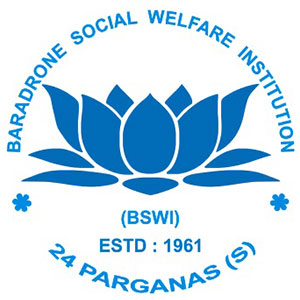Economic Advancement & Basic Necessities
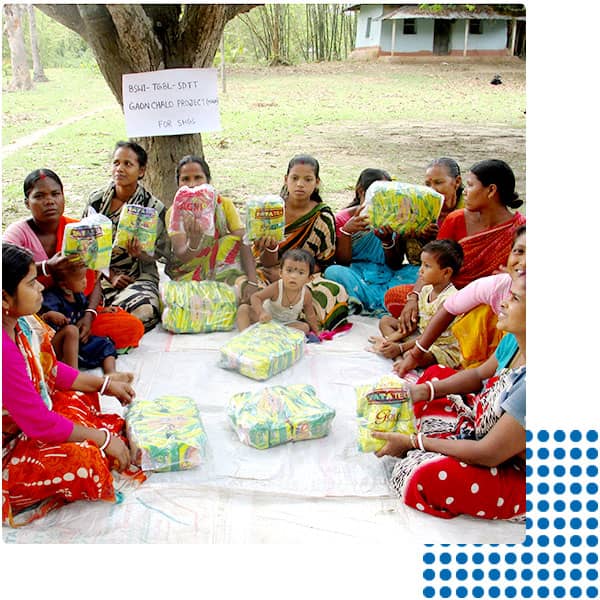
Economic Advancement principles and the livelihoods framework
The economic advancement principles and framework of BSWI form the basis of all livelihoods programming. The fundamental principles of our livelihoods programming are that it is people-centered, multilevel, dynamic, and ultimately aim to achieve sustainable livelihoods.
People-centered
BSWI’s Livelihoods programming fully involves the people whose livelihoods are affected. Our livelihoods approach identifies programs based on the priorities and goals defined by people themselves and support their own livelihoods strategies. It is always built on people’s strengths.
Multi-level and holistic
Our livelihoods programming recognizes multiple influences on people at different levels, and seeks to understand the relationships between these influences and their joint impact upon livelihoods. This includes influences at the micro-level (community and household). It also recognizes the multiple actors (from the private sectors to the administrators and local state bodies like PRI) influencing livelihoods. It acknowledges the multiple livelihood strategies that people adopt to protect and secure their livelihoods and multiple livelihood outcomes.
Dynamic
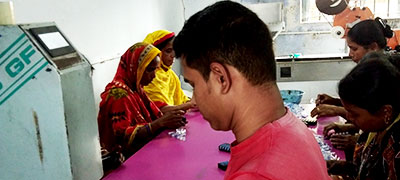
We work along the following lines:
- Promotion of Animal Husbandry amongst the SHG members: In the main centre’s farm house in Baradrone village, BSWI has been organizing animal husbandry training-cum-demonstration activities for the SHG members and each year it has been training about 350 women members of the SHGs.
- System of Rice Intensification (SRI): BSWI introduced this technique in its North Bengal project area since 2009 to enhance the productivity of rice, the people’s staple food. In 2016-2017, more than 3500 farmers followed this technique in 5250 acres of land. During the period of 2016-2020, 16,000 small and marginal farmers multiplied paddy production by 1.7 times.
- Improved Vegetable Cultivation: Second activity in this category has been vegetable cultivation. BSWI encouraged vegetable cultivation as a supplementary livelihood activity and provided seeds, saplings, seedlings and fertilizers.
- Water management: In order to augment a captive source of water, BSWI supported digging of small, field level tanks in individual farms. The farmers could irrigate their small vegetable plots with this storage.
- Releasing of Mortgaged Land & Supplementary Economic Activities: Considering the high incidence of land-mortgaging, BSWI is encouraging releasing of the lands and encouraged SHGs to advance loans to the needy families. Other associated activities included encouraging goat rearing as a supplementary livelihood measure. In order to explore the potential of marketing the local produce, BSWI commissioned a study on ‘Livelihood Options with Market Mapping and Value Chain Analysis’. The recommendations are being materialized by BSWI now. Training and capacity building of farmers and other beneficiaries is also on-going project activity.
- A Garment Making Unit named “PROCHESTA” has been set up in Panchpara village of Gazole block, Malda district in West Bengal involving 25 SHGs.
- Social Enterprise: A Social Enterprise Program has been active under the SHG Federation “PROBODHAN” by selling garments in fair price basis that is helping the poorest community obtain products in fair price. Various rural development works like providing school materials to poor students, free medicinal support to the needy and destitute, admission/re-admission of dropout girls and other needs are being supported out of the surplus being generated from the Enterprise.
Sustainable

To BSWI, livelihoods are sustainable when:
- they are resilient in the face of external shocks and stresses;
- they are not dependent upon external support (or if they are, this support itself is economically and institutionally sustainable);
- they maintain the long-term productivity of natural resources, and
- they do not undermine the livelihoods of, or compromise the livelihood options open to, others.
BSWI believes that a person’s economic advancement and livelihood refer to their means of securing the basic necessities, i.e., food, water, shelter and clothing – of life. Economic Advancement is defined as a set of activities, involving securing water, food, fodder, medicine, shelter, clothing and the capacity to acquire above basic necessities working either individually or as a group by using endowments (both human and material for meeting the requirements of the self and his/her household on a sustainable basis with dignity. Many relevant organizations and experts have found BSWI’s Sustainable Livelihood (SL) concept to be offering a more coherent and integrated approach to poverty. We have arrived at the following composite definition of a sustainable rural livelihood, which is applied most commonly at the household level: To us, “A livelihood comprises the capabilities, assets (stores, resources, claims and access) and activities required for a means of living: a livelihood is sustainable which can cope with and recover from stress and shocks, maintain or enhance its capabilities and assets, and provide sustainable livelihood opportunities for the next generation; and which contributes net benefits to other livelihoods at the local levels and in the short and long term.
BSWI’s concept of SL is an attempt to go beyond the conventional definitions and approaches to poverty eradication. These had been found by us to be too narrow because they focused only on certain aspects or manifestations of poverty, such as low income, or did not consider other vital aspects of poverty such as vulnerability and social exclusion. We now recognize that more attention must be paid to the various factors and processes which either constrain or enhance poor people’s ability to make a living in an economically, ecologically, and socially sustainable manner.
BSWI optimizes the resources available to the poor by helping them access funds and build their assets and capabilities so they can earn a decent living. BSWI has helped nearly 28,000 people participate in income generation activities like agriculture, fruit orchards, khadi, animal husbandry and small businesses/trades. For example, our “home-grown chicken initiative” is the significant program of its kind in West Bengal.
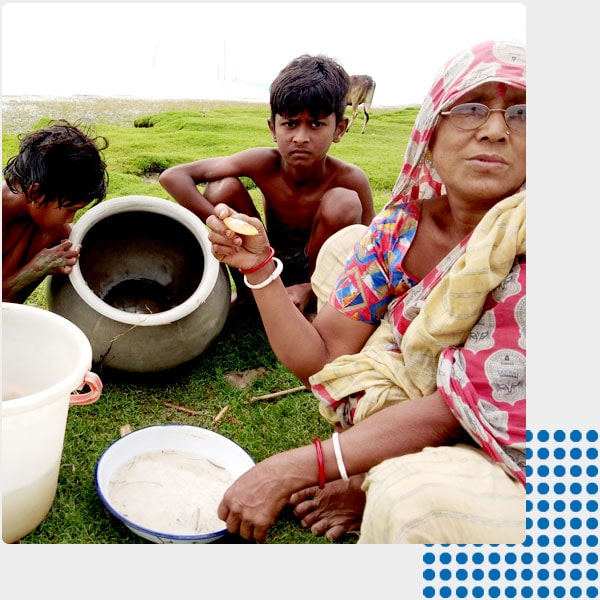
Food Security
BSWI has assisted nearly 75000 rural families with crop selection and access to modern markets, enhancing their productivity by three to four times and ensuring year-round food security. Some 8200 farmers are organized into 270 Agriculture Production Groups to better participate in markets. Nearly 15,000 families grow cash crops, such as tomatoes, cabbages, cauliflowers, broccolis, chilies that not only added to their incomes but also helped the participating farmers augment nutritional benefits from.
Water
BSWI has worked with more than 16,200 families to assure irrigation in 3,174 hectare (ha) and has improved soil- moisture availability in an additional 2,962 hectare (ha).
Managing Natural Resources
BSWI supports more than 14,000 small-holding farmers with integrated natural resource management to build resilience to water variability caused by climate change. We have designed methods ranging from small-scale on- farm water control measures to selecting crops that utilize residual moisture and are more adaptive to water stress and water surplus conditions. Farmers adopt eco-friendly technologies and use weather prediction tools made available by BSWI to diversify production risks and adapt crop choices.
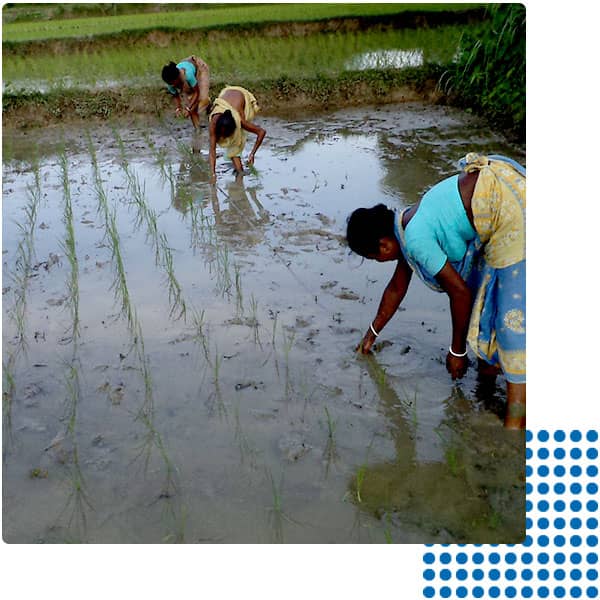
Organic Farming
BSWI has initiated a farming technology named “Zero Budget Natural Farming (ZBNF)” that is a method of farming where the cost of growing and harvesting plants is zero as it reduces costs through eliminating external inputs and using local resources to rejuvenate soils and restore ecosystem health through diverse, multi-layered cropping systems. It requires only 10% of water and 10% electricity less than chemical and organic farming. The micro-organisms of Cow dung (300–500 crores of beneficial micro-organisms per one gram cow dung) decompose the dried biomass on the soil and convert it into ready-to-use nutrients for plants.
Biodiversity and climate change
At the local scale, BSWI responses to the drivers that might promote both local biodiversity and human well-being by acting on the synergies between maintenance of local biodiversity and provision of key ecosystem services. BSWI provides financial assistance for Integrated Natural Resource Management (INRM) to local small and marginal farmers for ecosystem services that show promise of improving the allocation of ecosystem services and are applicable to biodiversity conservation.

